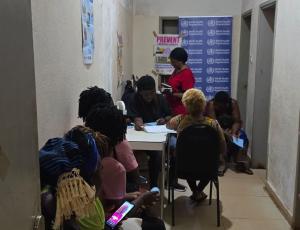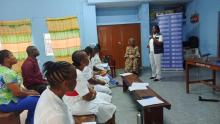Cervical cancer screening brings early detection and care closer to women in Kenema district.
Kenema, Sierra Leone – For Mariama Sankoh, a 36-year-old mother of two, visiting the Kenema Government Hospital for a routine health check turned out to be a life-changing experience.
"I went for the screening because I heard about it through community sensitization," Mariama explains. "The nurses were kind and explained the process. When they told me I had early signs of a problem, they treated me the same day. I am thankful I came."
Mariama is one of 144 women who received cervical cancer screening services during a five-day activity from 26 to 30 May 2025. The screening was part of efforts by the Ministry of Health, supported by the World Health Organization (WHO), UNFPA, Well Woman Clinic and other partners, to establish a Cervical Cancer Screening and Treatment Unit at Kenema Government Hospital. The new unit is integrated into the hospital’s reproductive health services and linked to HIV care.
Cervical cancer is a leading cause of cancer-related deaths among women in Sierra Leone, particularly among women living with HIV, who are at higher risk. Many women are not screened until symptoms appear, by which time treatment options are limited.
To address this, the Ministry of Health, with support from WHO and partners, is working to expand access to early detection and treatment services at the district level. WHO supported the delivery of training sessions, and helped facilitate coordination between reproductive health and HIV services.
"Before this refresher training, we had limited capacity to screen for cervical cancer locally," says Nurse Agatha Kekura, one of the service providers. "Now, we can screen and provide treatment right here. This helps women get care quickly and closer to home."
During the five-day activity, eight health workers including reproductive health providers and HIV counsellors, received training on cervical cancer prevention, the link between HIV and cervical cancer, and how to integrate services effectively. WHO worked closely with the Ministry of Health to facilitate the training and provide technical guidance. Screening services were complemented by on-the-job training and mentorship to ensure high quality service delivery.
"Many women came because they heard about it through community talks," says Sister Sally Carew, the national coordinator for cervical cancer screening. "That awareness helped women like Mariama seek care at the right time."
Dr. Abibatu Kamara, Technical Officer for Sexual and Reproductive Health and Rights at WHO, emphasized the importance of integration and local ownership in strengthening women’s health services: "This initiative shows how much can be achieved when screening is brought closer to the people and integrated into services that women already use. Training service providers and integrating cervical cancer screening with other reproductive health services ensures we are building sustainable and responsive health systems."
The establishment of the screening unit at Kenema Government Hospital is an important step toward improving women’s health services in Sierra Leone. It supports the country’s commitment to the World Health Organization’s 90-70-90 targets for cervical cancer elimination, which aim to increase vaccination, screening, and treatment rates.
"This experience taught me the importance of regular check-ups," says Mariama. "I feel more confident about my health, and I encourage other women to go for screening too."
The Ministry of Health, with ongoing support from WHO and partners, plans to expand cervical cancer screening services to other districts and ensure continuous mentoring and training for health workers. Sustaining community engagement and strengthening integration between reproductive health and HIV services will remain a key focus.




